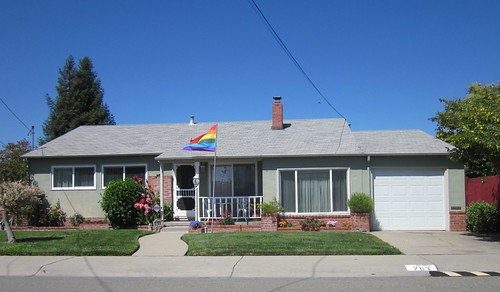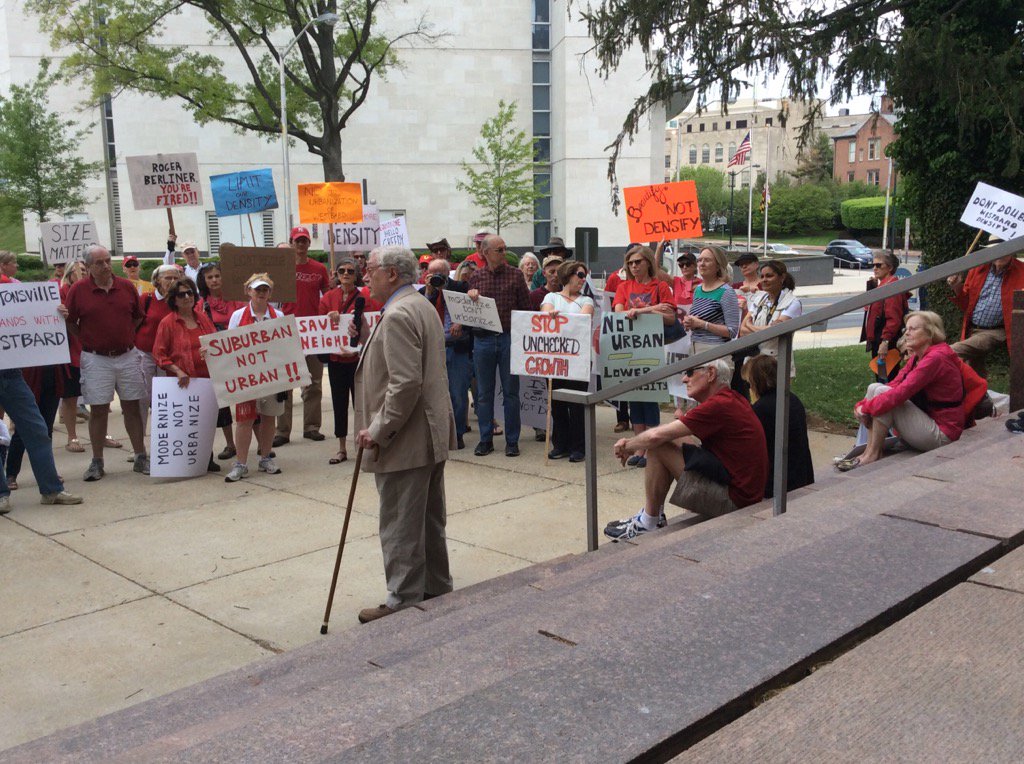Just in time for this year’s elections, Montgomery County has a new LGBTQ political organization. Here’s why I’m hoping that the newly-formed Queer Democrats will look at access to housing and transportation.
 |
| A pride flag outside a suburban house (though not in MoCo). Photo by mary on Flickr. |
Writing in Slate, my friend and New York activist Andrea Bowen cited a study that trans people there are consistently poorer and face more food insecurity than their cisgender counterparts. “You can ban certain types of discrimination,” she writes, “but that doesn’t mean an oppressed population’s access to the things that make life good - say, food, income, or medical care - is actually going to improve.”
There are challenges that LGBTQ people face across the United States, in finding work, finding economic stability, or finding a stable place to live:
- It’s harder for us to find jobs: queer adults are 21 to 47 percent more likely to face employment discrimination, and a study found that “observably gay” job applicants are 40% less likely to get called for a job interview.
- When queer people do find jobs, they get paid less than their straight counterparts. Gay men earn 10 to 32 percent less than their straight counterparts, and are more likely to be penalized for not being discreet about it (such as announcing that they live with a same-sex partner). Ironically, the income gap is largest in high-paying, prestigious jobs, not unlike those you’d find here in the DC area.
- It’s also harder for us to find housing: 15 percent of lesbian, gay, and bi people, and 19 percent of trans people, reported facing some discrimination in searching for housing. Meanwhile, LGBTQ+ people comprise 10% of the homeless population, and 40% of the homeless youth population, as some young people are still rejected by their families for coming out.
- As a result, queer people are more likely to face economic insecurity. It’s hard to keep a job when you don’t have a stable place to live (or vice versa). Twenty percent of LGBT people (and one-third of trans people) around the US live below the poverty level, compared to just 17% of single straight people. Over a quarter of queer people faced food insecurity in 2015.
This is something local governments can help solve
Economic insecurity isn’t an exclusively queer issues, but it’s an opportunity to make a huge difference in the lives of queer people. It’s also something that local governments are uniquely suited to tackle.
For instance, Montgomery County, like most local jurisdictions, is in charge of land use (which means where and how you can build housing) and transportation. And research shows that access to reliable, fast transportation is the leading indicator of getting ahead. For LGBTQ people who disproportionately face economic and social hardships, where you live, and what jobs you can get to, are crucial for your ability to live a good life.
 |
| The lighter areas have shorter commutes, and tend to be more expensive. Image from WNYC. |
For example, here’s a map of commute times in Montgomery County. Not surprisingly, commute times are shortest around Bethesda, the county’s largest job center, and higher basically everywhere else.
That access to jobs costs money, and in Montgomery County, communities near major job centers have seen their home values fully recover from the Great Recession and, in some cases, even rise above their 2004 levels. The median home value in the county is $420,000, putting even a modest home out of reach for many Montgomery County households.
Meanwhile, further-out areas with less access to transit or jobs have lost value. It’s in these areas where people with lesser means are forced to live. That produces economic and racial segregation, which exacerbates inequality in our school system, which in turn reduces economic opportunities. The Census doesn’t collect enough data on queer people for us to know a lot about where they live. But this burden will fall hardest on minority and oppressed populations, like the LGBTQ community.
“That LGBT people face these higher rates of disadvantage means the national lack of affordable housing specifically harms LGBT individuals,” writes Brooke Williams from the Century Foundation in a report about housing for queer people.
That’s why the Century Foundation recommends getting rid of exclusionary zoning policies that basically outlaw affordable and middle-class housing in many neighborhoods, including much of Montgomery County. Building more transit, like the Purple Line and BRT, will also have a huge impact on economically disadvantaged queer people by giving them better access to jobs.
How the fight for fair housing resembles the fight for LGBTQ rights
Yet there’s a tremendous amount of pressure in Montgomery County to not do these things, which comes from residents who fight change in their communities. The Purple Line is finally getting built after years of opposition from wealthy neighbors, as is bus rapid transit. Meanwhile, neighbors continue to fight new development in their communities, from townhomes to affordable housing to allowing a homeless family to occupy a vacant house.
 |
| Bethesda residents protest the Westbard plan. Photo by Sonya Burke on Twitter. |
Take the claim that Montgomery County was waging “war on suburbia” by allowing the construction of apartments and townhouses in Bethesda's Westbard neighborhood, or that it would “destroy” the local culture and endanger the ability of people to raise children. Or the argument made by one neighbor in Silver Spring that plans to build a town center in White Oak was part of a plot to force people to quit their jobs and become a barista.
Ironically, some of these people may identify as progressives, support progressive causes, and may even support LGBTQ causes. Yet the impulse to keep change out of their backyard ultimately harms disadvantaged people. After all, people who can afford to drive will continue to drive for lack of other options, and people who can afford to pay top-dollar for a home won’t really be affected by a dearth of housing.
But a lot of people will lose out in this situation, especially anyone with a history of facing prejudice or economic disadvantage. Like I said, this isn't an exclusively queer problem, but it's one that queer people and allies should pay attention to.
If you'd like to hear more, come see me speak at the newly-formed Queer Democrats of Montgomery County at their monthly meeting this Monday, January 29 at 7pm in Kensington. For more information, visit their Facebook page.

No comments:
Post a Comment